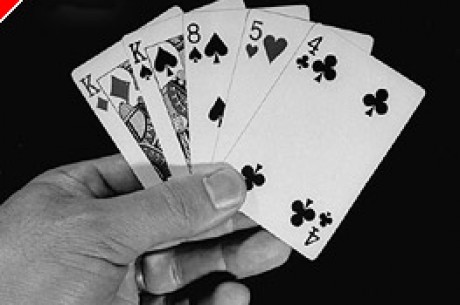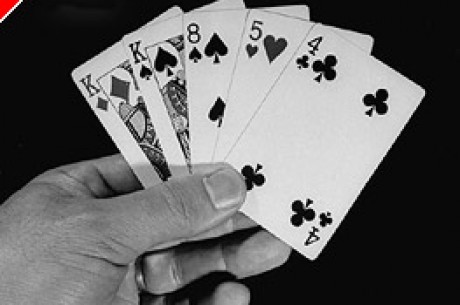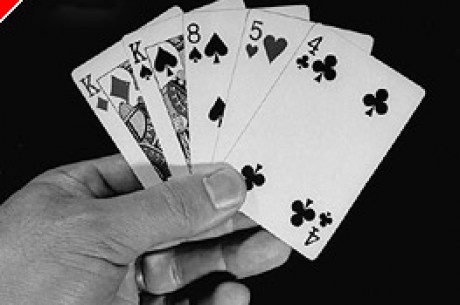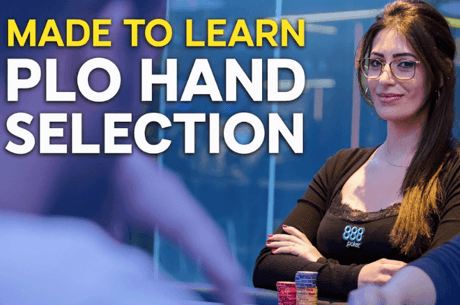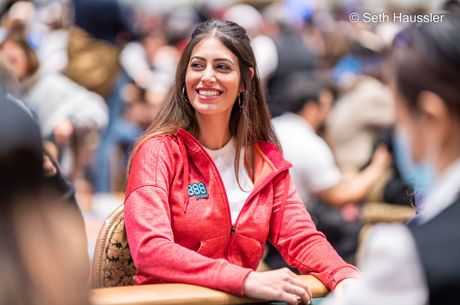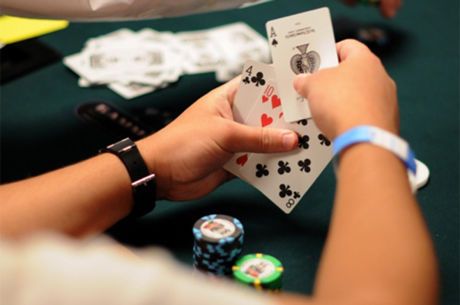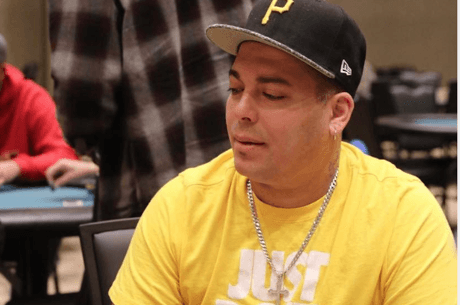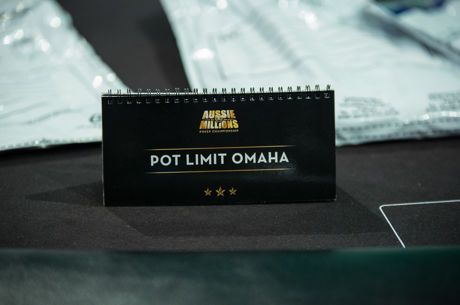Talking Omaha Poker - Case Study Two
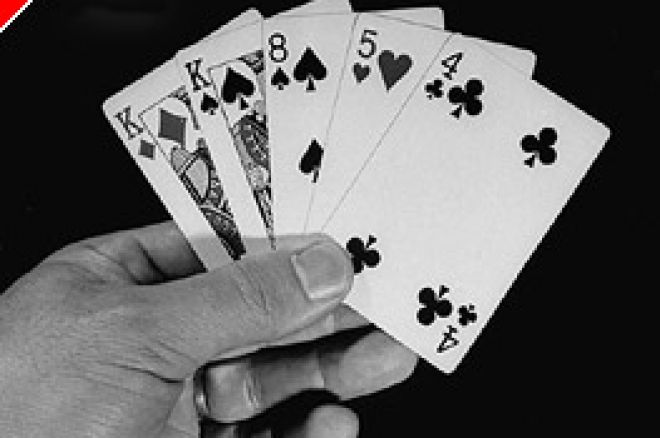
Tony is a regular on-line and card room player living in England. He mostly plays Texas Hold'em and Omaha (High and Hi/Lo) at fixed, pot and no limit, at both cash and tournament tables.
Now where were we?
Oh, yes, in the middle of a pot limit Omaha game. Last week, I recorded, hand by hand, a session on a short-handed table playing pot limit Omaha High at blind levels $0.5/1, starting with $100. I had reached a point where I had played solidly but got caught with a 3-outer river by an opponent with his small stack all-in. Consequently, I found myself $6 off my starting pile instead of a potential $50 up after half an hour's play.
Such are the variations in pot limit play, but perseverance is the name of the game, assuming you are happy with the quality of your game. If not, quit before it gets you in the wallet!
Re-group and on to the next hand
Remember I am playing a 5-handed table where a lot more action is likely and so the under-the-gun position is merely two seats behind the button.
Hand 12; Small blind: All junk. Folded without further ado.
Hand 13; Button; Kd 8s 7c 6c
I consider raising on the button if it is flat-called to me but the German behind me raises first, so I fold. Hindsight can be wonderful and the flop came down K 7 6 which might have encouraged me. There was some strong betting so I do not know if I would have stayed in, as I am always wary of any 2-pair hand at the flop. The river was a 7 and, had I stayed to see it, would have been trumped by the German who had raised pre-flop, as he showed down K K x x! That, in a nutshell, is why you fold raggy hands pre-flop.
Hand 14; Cut-off; As Qs 9h 6h.
I limp in with the field and see a flop of Ts 4s 8d, giving me a nut flush draw and a gutshot draw for a nut straight. It is checked to me so I bet the pot of $4. I receive one call from the German behind me, who holds the biggest stack at this table. The turn is a splendid spade, 3s. The German checks, so is probably without spades, and I bet a flat $4. He thinks and calls $4. The river is the Qh and it is again checked. I bet $15, which is $4 short of a pot bet, to see if he has something and is tempted to call. And yes, he calls. That tasty pot takes me up to $117 for a $17 profit to date.
Hand 15; Under-the-gun; Ts 9s 8s 7h
This is a nice looking hand for straight draws. I make a small opening raise to $3. I get called all round and see an unfriendly flop of 2d 5s Jh. I decide not to represent strength here with so many callers present and it is checked all round for a free look at the turn. This is 6d, and things are looking up. I need any 4, 7, 8 or 9 which is 13 outs. I can try for a cheap look at the river, for a value call, or attempt a pot bet of $15 and try to take the pot as it stands and not rely on the river card. I decide to go for the latter and bet out $15. This is a risky semi-bluff but no-one but me has raised at any time so far in this hand so there is a chance of success. Yes, they all fold and I take the pot, moving my stack up to $128.
Hand 16; Big blind; As Qd 8c 7s
This is a motley bunch of cards but a nut flush or straight is an outside possibility. There is no raise so I get a free look at the flop of Kc Ad Ts. This gives me top pair, a gutshot straight draw and a backdoor nut flush draw (2 spades needed). I check and so does everyone else. The turn is 4d. I check again and get another free look. The 6h is no help. All checked down and the German shows aces up with the 6 on the river. I put caution before bravado on that hand. Better to wait for good cards.
Hand 17; Small blind; Qh 7c 7d 4d
Flat called, so I make up the blind and see a flop of Kc 7h Js which gives me a set of 7's. This type of hand has cost me heavily in the past so, first to go, I bet $3 to see where I am. If anyone has J J or K K, they might re-raise here and I can fold for safety. I receive just one caller, so that is promising. The turn is 2c which is harmless so I decide to get bold and pot bet $10 to discourage any drawing to the river. It's enough for the pot of $10 putting me up to $133.
Hand 18; Button; Kc 9h 9s 7h
Not a great hand and it is flat-called to me. I call for $1. The small blind raises the minimum to $2 (why would he do that?) and we all call. The flop is 6h 6c Qh, giving me a moderate draw for a flush, which I am not happy with really. A bet of $3 comes out so I fold for safety. The turn was 8h which would have offered a straight flush draw on top of a made flush. The hand did not complete to the river so we move on.
Hand 19; Cut-off; Ad Js 7s 4s
Flat-called all round but I decide to fold. I have to tell myself to avoid too much limping and this hand doesn't offer much.
Hand 20; Under-the-gun; Kh Qc 9c 7d
I decide to fold as I'm out of position and it is a marginal hand at best. This decision is vindicated with a pot bet from the button which I would have been reluctant to call. This got some callers which adds value to the pot. Frustratingly the flop of 8c Js Ts would have fitted my hand perfectly, except with a spade draw. The button pot-bet $18 and was called by the German behind me. The turn was the 5c and a big pot bet scared the German off. I suspect the winner was holding aces.
Hand 21; Big blind; rags. Folded to two bets ahead of me.
Hnad 22; Small blind; Ad Kc 7d 4c
A double suited hand, which is a little raggy, but I make up the blinds as everyone flat calls. The flop is Th 3h 3s, which misses me completely. I check and see a turn card for free, the Td for two pairs on board. I check again and see a free river, the Ac. That gives me 2-pair, aces over tens, with king kicker. I put in a small $2 bet and it was raised and called to $4. I decide to make the $2 call, not very sensibly despite the value. One has the 3, one has the T. This is a hand I was in simply because I made up the small blind and it has cost me $7. A lesson in limping!
Hand 23; Button; all rags, fold.
Hand 24; Cut-off; Td 8c 7h 3h. Folded without hesitation.
Hand 25; Under-the-gun; Qh Jh 9d 2s. Again folded mainly for the rag 2.
Hand 26; Big blind; Ah Kc Jd 3c
Checked to me. Flop 3h 7h 7d. Not a lot and I fold to the first bet.
A new player arrives on my left and the next one has sat out, so the next round is 3-handed.
Hand 27; Small blind; Ks Qh 8s 7d
One folded player leaves me heads up but I decide to limp. Flop is Jh 5d 8h. Check, check. 2c. Check check. Js. I bet $2 and take a tiny pot.
Hand 28; Button; 6h 6s 5d 3c. Fold.
Hand 29; Button again due to a player leaving; rags. Folded.
Hand 30; Big blind; 6h 6c 5d 4s
Flat-called; flop 7h Ts 9s which is no good and I fold to a bet.
Hand 31; Small blind; 5h 4d 3c 3s
More rags but the button has folded and my heads up opponent has $12 left in his stack. I see a cheap flop of 9h Th 2h, all hearts. I check. The turn is also a heart, the 3, giving me a set of 3's and an open-ended straight draw. I bet $2 pot and take it.
Hand 32; Button; Ks Qh 8c 4d
This is now heads up and the game is petering out. I fold to his bet.
Hand 33; Big blind; Kc Qh Tc 2s
I raise to $3 and it's called. The flop is 4c Th Qd giving me top 2-pair. I pot bet $6 as he only has $9 left. He re-raises all-in. I call $3 to complete the betting and see an A and 6. His hand is J J 9 5 looking for a straight. I have boosted my stack to $136.35 and I decide to call it a day.
An hour's work
All in all, $36 is not a bad return in an hour at low stakes Omaha poker playing conservatively, trying to avoid unnecessary risks at all times. So long as you are willing to back your hands with strong betting when you believe you are leading and start betting with good pre-flop hands only, you should come out on top allowing for the variations in luck that inevitably hit from time to time.
Next time, I'll have a go at a pot limit Omaha Hi/Lo table. I haven't played the table yet so I do not know how it will turn out but it will be a first take and variations are greater in this game!
TB
5-1-06
Ed note: Good Omaha games at Doyle's Room

